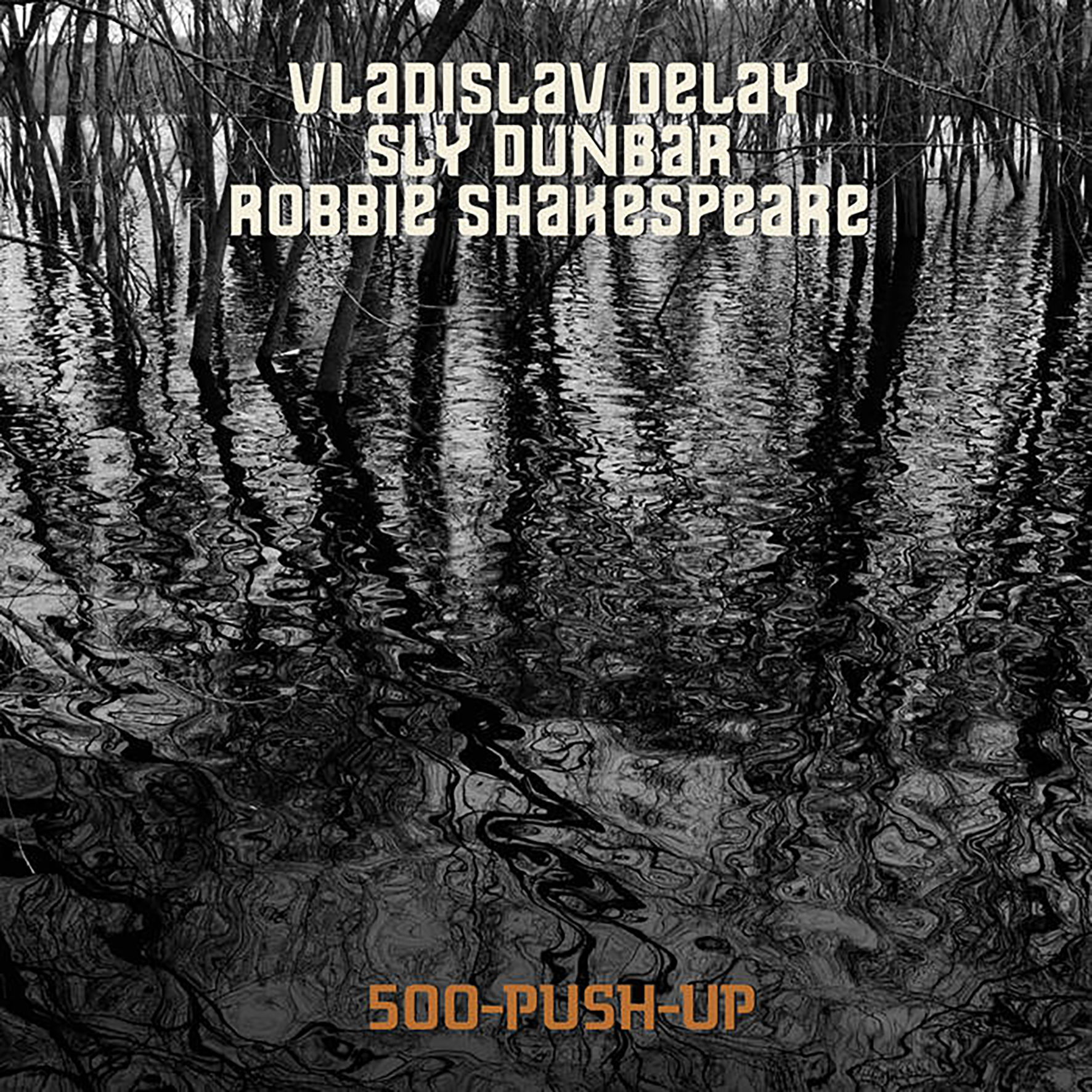Vladislav Delay/Sly Dunbar/Robbie Shakespeare, "500-Push-Up"
 This unusual and inspired collaboration between a Finnish experimentalist and one of Jamaican music's most iconic rhythm sections has its roots in an even more unlikely previous pairing: 2018's Nordub album on the venerable OKeh label. On that album, Sasu Ripatti's role was primarily that of a producer for a melodic and accessible jazz/dub hybrid, but the very different 500-Push-Up documents the far more cacophonous and freewheeling side of their collaboration that resulted from Ripatti's move into the driver's seat. Moreover, this second reunion occurred at a particularly interesting time, as Vladislav Delay's harsher recent work is light years away from Ripatti's heyday as a dub techno producer. While I am sure that a version of this album featuring the Vladislav Delay of the early 2000s would have been absolutely wonderful as well, the less disparate aesthetics of the participants would have likely led towards considerably more familiar territory than this one does, so maybe it is for the best that this union did not occur until now. At its best, 500-Push-Up sounds almost like it is carving out an new genre that blurs the lines between hip-hop beat tapes, fluid reggae bass lines, and hallucinatory electronic chaos.
This unusual and inspired collaboration between a Finnish experimentalist and one of Jamaican music's most iconic rhythm sections has its roots in an even more unlikely previous pairing: 2018's Nordub album on the venerable OKeh label. On that album, Sasu Ripatti's role was primarily that of a producer for a melodic and accessible jazz/dub hybrid, but the very different 500-Push-Up documents the far more cacophonous and freewheeling side of their collaboration that resulted from Ripatti's move into the driver's seat. Moreover, this second reunion occurred at a particularly interesting time, as Vladislav Delay's harsher recent work is light years away from Ripatti's heyday as a dub techno producer. While I am sure that a version of this album featuring the Vladislav Delay of the early 2000s would have been absolutely wonderful as well, the less disparate aesthetics of the participants would have likely led towards considerably more familiar territory than this one does, so maybe it is for the best that this union did not occur until now. At its best, 500-Push-Up sounds almost like it is carving out an new genre that blurs the lines between hip-hop beat tapes, fluid reggae bass lines, and hallucinatory electronic chaos.
While it is admittedly still an uncommon event, there have been several recent collaborations between contemporary electronic/experimental artists and luminaries from the golden age of Jamaican dub and it is always intriguing to see which direction they head in.The reason for that is quite simple: in this case, Sly and Robbie have a resume that stretches back to classic fare like The Upsetters, The Aggrovators, and The Revolutionaries, but the pair did not remain frozen in time and have continued to evolve over the ensuing decades, exploring other genres and collaborating with artists as varied as Grace Jones, Yoko Ono, Bill Laswell, and Bob Dylan.In short, Sly and Robbie have proven themselves to be a rather adaptable twosome with the one real constant being that they are excellent instrumentalists with a deep chemistry.Given that unquestionable and influential prowess as a tight rhythm section, Ripatti wisely decided to make Sly and Robbie's signature grooves the foundation for this project (as opposed to their production skills), visiting Kingston in early 2019 to record some bass and drum rhythms with the pair (as well as few field recordings and vocal passages).For the most part, Ripatti generally leaves those rhythms fairly unmolested, but it is primarily Robbie Shakespeare's bass playing that drives these songs and holds everything together, as Dunbar's drumming is sometimes deconstructed or enhanced with visceral industrial heft.The latter is most evident on pieces like "(520)" and "(519)," as the sounds of Dunbar's kit seem enswathed in a reverberant chaos of machine-like textures.The former approach is evident too, as the drums actually fall completely away by the end of "(519)," revealing quite a complex and hallucinatory sound collage lurking within its hum of industrial ambiance.
As my personal sensibility is far more "Throbbing Gristle" than "Peter Tosh," it is unsurprising that those more mechanized and outré moments are the ones that resonate most strongly with me.Beyond that, however, my interest in the project lies primarily in hearing what emerges when Sly and Robbie's expected aesthetic is aggressively reshaped by Ripatti, as there are already plenty of fine Sly and Robbie releases in the world and they definitely do not need Vladislav Delay's help to perfect their own vision.Ripatti acts as a chaos agent here. gleefully disrupting the expected in ingenious ways.In that light, my favorite piece on the album is the aforementioned "(520)," as Ripatti crafts a massive, shuffling groove that burrows relentlessly through a cacophony of blooping electronic weirdness and field recordings of city sounds.Naturally, "(519)" is yet another of my personal highlights, as Shakespeare's bassline drives a surreal plunge into a swirl of chopped-up vocals, churning field recordings, and echoing psychedelic flourishes.While the trio are admittedly at their best when Ripatti aims for heaviness, they also find some success when he takes a wilder, more playful tone, as he does on "(514)," which marries an insistent, stomping groove with woodpecker-like electronic bleeps and looped and chopped vocal yelps.Sometimes that side creeps too far into indulgence for my taste, as it does on the weirdly cheery "(512)," but Ripatti does manage to make an otherwise unspectacular '80s reggae groove seem like a deranged mindfuck of whirring electronics and clattering metal cans.Other times, however, that approach yields some very likable, leftfield results, such as on the opening "(513)," in which Shakespeare’s insistent major key bass line becomes increasingly submerged in a haunted landscape of tape hiss, strangled blurts, and heaving metallic textures.In fact, the best part comes at the end when Ripatti carves away everything but a shuddering snippet of radio that fades in and out of focus. 
While I would not necessarily characterize it as a flaw with this album, it is worth noting that a significant part of classic Jamaican dub's appeal lies in the fact that producers were deconstructing and repurposing actual songs: it was the collision of strong hooks, melodies, and grooves with an experimental approach to composition that made the genre so unique and enjoyable.There are no such songs lurking at the heart of 500-Push-Up, so the relative success of these pieces tends to lie in how successfully Ripatti's electronic assault manages to fill that void, though sometimes the grooves are solid enough to carry the day on their own.Obviously, it would have been great if some label had both the resources and the will to enable this trio to devote themselves to a fully fleshed-out studio album of real songs with vocals and hooks, but Ripatti thankfully proved to be impressively resourceful in reshaping the trio's raw material alone in his studio in Finland.As such, 500-Push-Up is an absolute delight when it hits the mark.To my ears, that happens with roughly half of these songs, while the other half feels more like cool experiments that fall a bit short of truly catching fire.I suppose that ultimately makes this album a bit uneven and a comparatively minor entry in the discographies of all involved, but that does not detract from the exquisite pleasures of this one-off detour's high points.Moreover, 500-Push-Up reveals a welcome glimpse into the more loose and fun side of Ripatti's artistry, making this a comparatively accessible counterbalance to the wintry, abrasive vision realized earlier this year on Rakka.
Samples can be found here.



